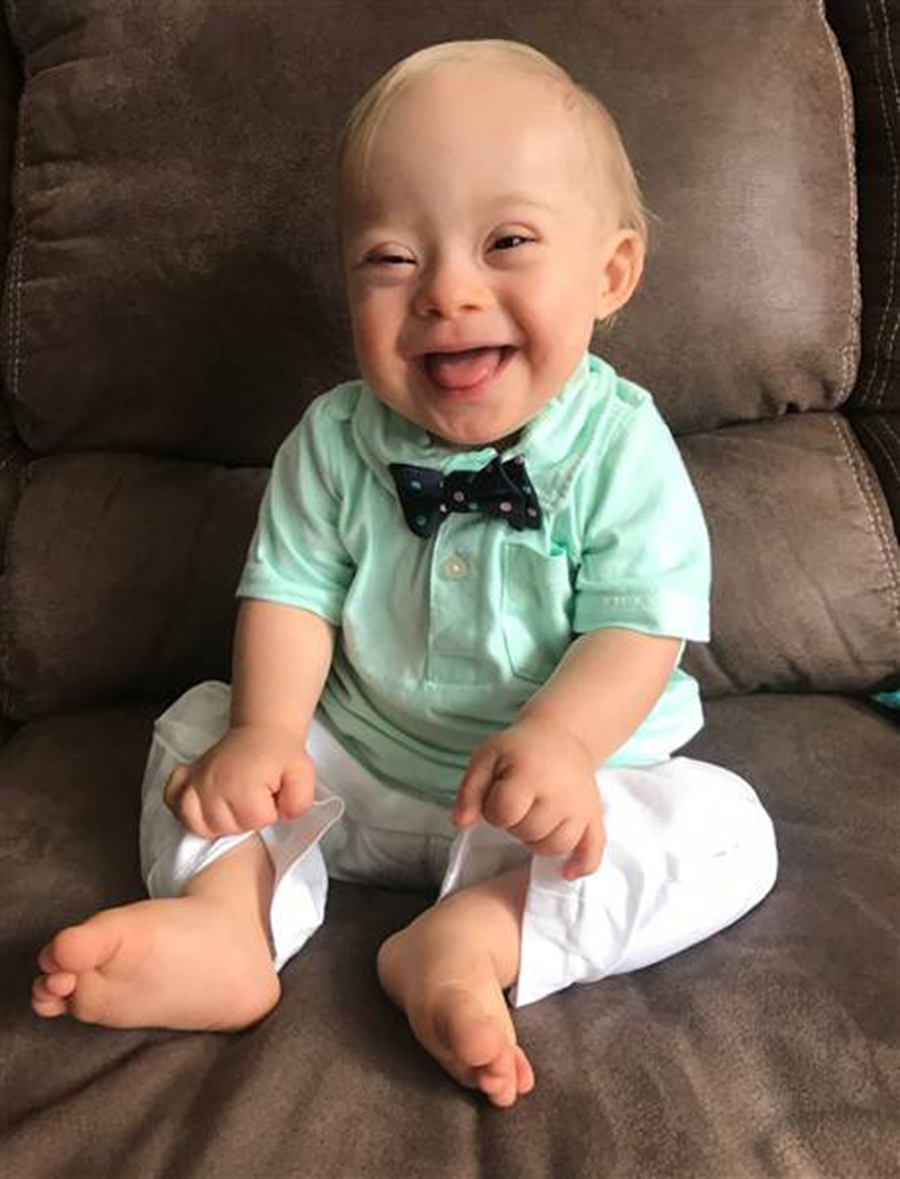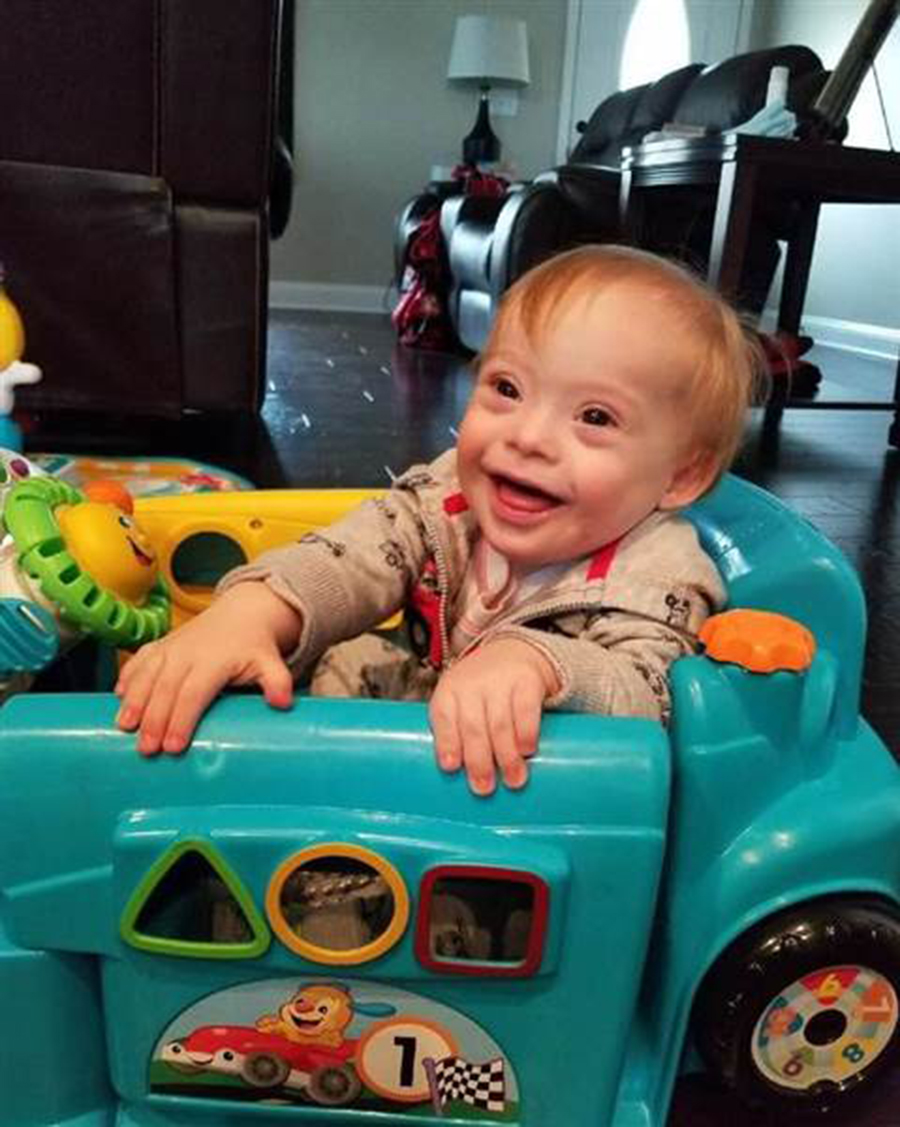Lucas Warren, from Dalton, Georgia, is the new Gerber Spokesbaby. The 1-year-old baby, born with Down Syndrome, is delighting the world as America’s cutest baby elected between 140.000 children.
CEO and president of Gerber, Bill Partyka, says Lucas won the iconic contest because of his beautiful and heartwarming smile. He also explains that the babies the company chooses are the ones who represent the heritage that recognizes “every baby is a Gerber baby,” making little Lucas perfect for this position.
Many users from social media platforms, like Instagram and Twitter, celebrated this election since mothers and other relatives from babies born with an extra chromosome feel represented by the fantastic decision.
Becoming Gerber Spokesbaby
Cortney Warren, Lucas’ mother, submitted his entrance to the contest after she found a relative told her that Gerber asked every year for delightful babies. Ms. Warren did not hesitate. She grabbed her camera and dressed up Lucas with a polka dot bow tie to capture his unique smile. She then posted the photo on Instagram and tagged it with #Gerber.

While Ms. Warrem is excited about Lucas’ success, she hopes this is an opportunity to attract the attention of the special community’s needings. This would hopefully help educate people and show them proper recognition and support.
“Individuals with special needs have the potential to change the world,” Lucas’ mom said.
Ms. Warren still expects that the world recognizes him as Lucas first: a baby with an amazing personality, extroverted, funny, and passionate about music. She wants people to see that her baby goes through the same issues as every other one. She hopes this ends being something beautiful for Lucas to look back at when thinking of his condition.
Down Syndrome
Also named Trisonomy 21, the disease is a genetic disorder caused by the presence of an extra chromosome – which is the third copy of chromosome 21. It is related to physical growth delay, distinctive facial features, and intellectual disability that ranges from mild to moderate. The appearance of the extra chromosome happens randomly, and not due to genetic reasons.
The third copy is produced when the 21 chromosome separation fails. This can happen during the egg or sperm development. Thus, instead of having the total of 23 chromosomes, the cell ends having 24.
When the cells of both mother and father combine, one of them consisting of 23 chromosomes and the other of 24, they forme a fetus of 47 chromosomes – instead of the most-common number, which is 46.

Lucas, 1, with his parents, Cortney and Jason Warren.
The Syndrome is one of the most common genetic disorders in the US. Approximately 1 out of 700 babies are born with it each year. Sadly, not every one of them grows up and reaches adulthood due to weak immune functions.
Other Down babies, on the other hand, end up acquiring congenital heart defects, leukemia, epilepsy, mental disorders and thyroid diseases.
Screening for Down Syndrome is recommended for all pregnant women. Nowadays doctors use different methods for the testing. Although none of them is perfect, if the screening shows positive, the results can be proven by samplings made with amniocentesis or chorionic villus.
What to expect and what to do
Since no parent is perfectly prepared for this situation, doctors always suggest a wide variety of conditions to improve in a significant way the child development, growth, and adaptation. Among the recommendations, they include a good family environment, work-related training, education, and proper care.
Early childhood intervention is suggested as well. This educational system aims to support kids (up to 6 years old) who are vulnerable to child abuse or neglection.
One of the specific goals is to give the families of the Down children a range of different resources. This, to help them maximize their child overall development and education of diversities between families and communities.
All babies born with Down Syndrome should get an electrocardiogram and ultrasound of their hearts to prevent different heart issues. Teenagers, on the other hand, require further tests due to heart valve problems that could present during adulthood.

Lucas, 1, with his parents, Cortney and Jason Warren.
Most children with Down Syndrome do not graduate from school in some countries – like Sweden. Nevertheless, a small hope-giving percentage does. 40% of them graduate in the US, and even most of them learn a skill that makes them able to do paid work.
Life expectancy for individuals with Down Syndrome has increased with the help of medical care – specifically for gastrointestinal and heart problems.
In 1912, the average Down child died at the age of 12. But after the 2000s, that expectancy increased to 60 years.
Before the Second World War, people diagnosed with Down Syndrome were sentenced to live in asylums or mental hospitals. Now we can expect baby Lucas, for example, to achieve a beautiful career and raise awareness on the matter.
Source: WebMD
